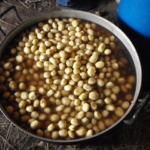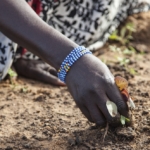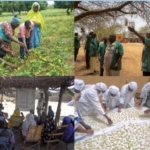


Institut de l'Environnement et de Recherches Agricoles
Burkina Faso
8/2018—8/2022
Building on its previous phases, the Bambara Nut FRN project will institutionalize a “Farmer Research Network” among 600 female farmers (supported by their husbands) from 30 villages in Burkina Faso, national researchers and students, and external consultants (if need be). Female farmers involved in each village will be a base unit of the “Farmer Research Network”. The network will use principles of agroecological intensification (AEI) to strengthen the switch from conventional agriculture towards sustainable and agroecologically intensified farming systems with a strong Bambara nut component in each village. Evaluation of AEI options in terms of species (sorghum, pearl millet, voandzou, peanut), varieties, agronomic techniques, social innovation, and negotiation (market) will be done by the female farmers in their individual fields or farms, supported by researchers. Thereby, different farmer types will be considered. Using available results of research and future options developed by the community of farmers and researchers, the individual production systems of different female farmer types will be optimized by looking into beneficial and functional interactions among the components (including animals and trees).This project is well aligned with CCRP strategies in terms of: (i) collaboration/FRN approach; (ii) AEI research focus; (iii) Farmer-Researcher co-creation; and (iv) student training. The project also considers values of equity, gender, human rights and ethical interactions by taking the sociological and cultural specificity of farmers’ village and different farm types into account. The leadership capacity of female farmers and governance aspects of their organizations and the new network will be tackled as well, thereby building on CCRP’s initiative to strengthen leadership capacities in the West Africa region – urgently required for the desired transformative changes of the agricultural production systems.



